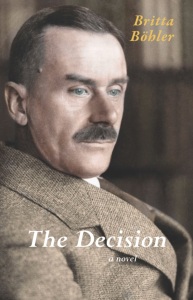 Reviewed by P.P.O. Kane
Reviewed by P.P.O. Kane
The Decision
By Britta Bohler
Translated by Jeannette K. Ringold
Haus Publishing, 2015, ISBN: 9781910376133
Deploying a sonata-like structure (each day akin to a musical movement), this novel presents a snapshot of Thomas Mann at a crucial moment in his life.
It traces the writer’s thoughts – his doubts and hesitations and not least his fears – over the course of three long days and nights. At the end of this fretful period, Mann decides to make an irrevocable break with Nazi Germany. Henceforth, from 1936 on, he would be an implacable enemy of Hitler, a man who, anyway, he had always despised.
While reading the novel, I had cause to reflect on Mann’s antipathy toward Hitler and was led to conclude that what he saw in him was a travesty of himself, a self he had long ago rejected, or maybe a soiled reflection of his own image. Consider the similarities. Both men were passionate lovers of Wagner’s music, intoxicated by his Gesamtkunstwerk. Both had a mythic/mystical cast of mind and a corresponding contempt for science. They shared as well a belief in Germany’s destiny, its blessed Sonderweg. And that Mann was not entirely free of anti-Semitism is attested by his diary entry of 20 April 1933. One of the most convincing passages in the book, incidentally, is a contemptuous description of Einstein; the great scientist comes across as an ill-mannered buffoon who doesn’t know how to dress properly. It has the ring of authenticity. You are left in little doubt that that’s how Mann saw him.
Mann was an acute observer of political events and he had realised as early as 1933, an insight granted to few at the time, that communism and fascism were ‘kindred though divergent manifestations of the same historical situation’. Yet even after 1936 he retained links with the Stalin-backed Popular Front, breaking with it only in 1940. Another decision for the great man, though this time probably not so difficult. What was the cause of the fissure? Well, when the Popular Front began to justify and explain away Stalin’s alliance with Hitler, that’s when Mann decided that enough was enough. A letter to Prince Lowenstein ended his connection.
Britta Bohler has written a wonderful novel, an immersive and psychologically convincing account of Mann’s agony of decision. Smoothly translated by Jeannette K. Ringold, it is well researched and chock-full of sharp insights into one of the great writers of the twentieth century.
About the reviewer: P.P.O. Kane lives and works in Manchester, England. He welcomes responses to his reviews and you can reach him at ludic@europe.com He blogs at: